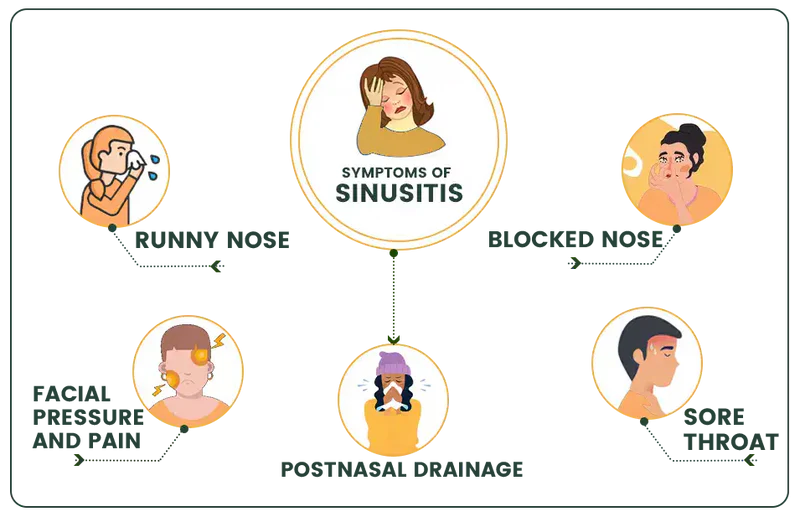-
info@drmishra.com
- +91 931 544 7150


What is Sinusitis?
Sinusitis is known as Pinas in Ayurveda. Sinuses are the hollow cavities that are present in the region of the skull. In this condition, the sinuses become inflamed and are blocked with mucus which causes congestion in the nasal passage. Sinusitis treatment in Ayurveda has a holistic approach to healing.
As per Ayurveda, Kapha (water) is accumulated in the sinuses and blocks the flow of Vata (air). When the Pitta (fire) is imbalanced it results in swelling of the tissues around the sinuses. Other factors which contribute are suppressing natural urges, and intake of excess oily, or processed foods. Ayurvedic treatment for sinus infection aims to remove the root cause of the disorder and provides long-term relief.
Types of Sinusitis

Acute Sinusitis
Acute sinusitis lasts up to around 4 weeks or less and develops rapidly. The main cause can be viral infections or seasonal allergies.

Subacute Sinusitis
Subacute sinusitis is a transition phase from acute to chronic sinusitis. The duration can be in between 4 - 8 weeks. Seasonal allergies or bacterial infections can result in this type.

Chronic Sinusitis
Chronic sinusitis lasts for more than 12 weeks. This can be due to persistent allergies, bacterial infections, or deformation of the structure of the nasal region. Three months is a long time, so Ayurveda is recommended for chronic sinusitis treatment.
Causes of Sinusitis
- Immunity: Immunity plays a major role as a weak immune system can result in catching colds, and flu easily. Hence, resulting in sinus blockage.
- Respiratory Tract Infection: Infections present in the respiratory tract can also flare up sinusitis. Asthma often acts as a trigger for sinusitis.
- Seasons Allergies: People are often affected by seasonal changes. The cold can lead to sinus congestion, which can linger in the sinuses. As a result, bacterial infections develop.
- Nasal Polyps: The extra tissue growth in the nasal region can block the sinuses which can result in sinusitis.
- Deviated Septum: The structural deformation of the septum can impair the drainage of the sinuses. Deviated septum or crooked septum leads to blockage of the sinuses.
- Exposure to smoking: Smoking or exposure to cigarette smoke blocks sinus cavities.
+
Experience Year
+
Total Doctor
+
Total Patients
+
Service Of Diseases
Symptoms of Sinusitis
- Runny nose with thick, discolored discharge.
- Blocked nose causing difficulty in breathing.
- Reduced sense of taste and smell.
- Postnasal drip is the drainage of mucus down the throat.
- Inflammation around eyes, nose, and forehead.
- Feeling facial pressure and pain in the facial region.
- Episodes of headache.
- Halitosis, i.e., bad breath or taste in the mouth
- Extreme fatigue
- Sore throat

What our Patient says
Copyright Shiv Shakti Ayurved. All rights reserved.





